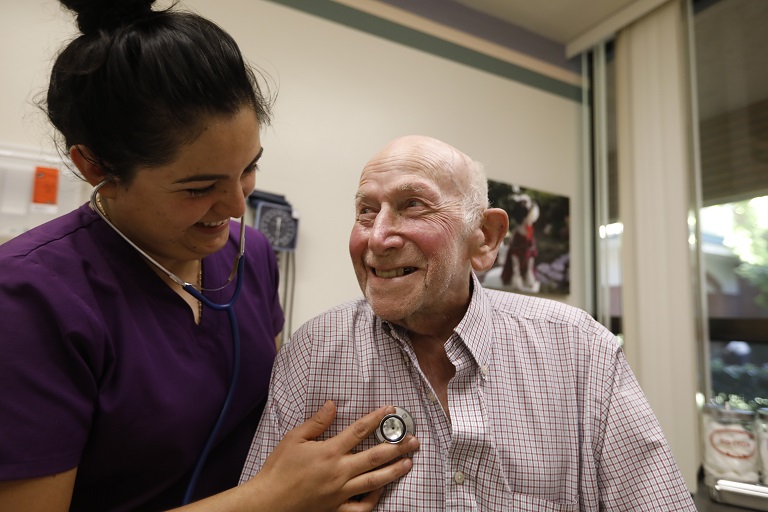Aging Services Town Hall: Omicron is here. Get a Booster
“The Omicron variant is spreading extremely quickly – as of this week, 73% of COVID cases in the U.S. are Omicron, as many as 90% in some areas.” So began Admiral Rachel Levine, HHS Assistant Secretary for Health, as lead speaker on the LeadingAge/AHCA/AARP Town Hall for Aging Services Providers, held the afternoon of December 21. “Our goal,” she said, “is that everyone who is eligible for a booster gets one before the end of the year – ten days from now. No one who is eligible should wait to get a booster.” The Town Hall centered around a full discussion of the Omicron variant and a push for all aging services staff and residents/service users to get a booster.
Other speakers at the well-attended event included facilitator Dave Gifford, Rogerson Communities CEO Walter Ramos (also a member of the LeadingAge board), and a family caregiver from Florida named Patti, whose father has advanced dementia and lives in a nursing home. All speakers began by acknowledging all that aging services providers have done over the past two years, as Walter Ramos said, “unselfishly, when you could have been spending time with your own families. And you did it with compassion. Now,” he added, “we are asking you to do more, to help residents, family members, and staff get a booster.”
Dr. Levine’s key points (presentation and during the Q&A) included:
· “We can’t let up because COVID is not letting up.”
· Unlike a year ago, we have the power to protect ourselves using vaccines and boosters.
· Nursing home residents are very vulnerable to COVID. Nursing home COVID case rates are highest where higher numbers of staff are unvaccinated. They are also high where staff and residents are fully vaccinated but not boostered. They are lowest where everyone has had the full initial series and a booster.
· Fully vaccinated people are 30-35% protected against Omicron; those with a booster are 70% protected against it.
· Booster doses take 10 days to be fully effective. People who are eligible need to get boosters now to reduce the size of the surge in January.
· The research on the severity of Omicron variant COVID was done on young people who are not immunocompromised. We don’t know how it will affect older, immunocompromised individuals.
· Even if Omicron caused illness is not as severe as earlier variants, the sheer number of people who will test positive for this highly contagious variant will overwhelm our health care system.
· If more health care workers are infected with Omicron, staffing shortages in nursing homes, hospitals, and other settings will get even worse.
· Natural immunity because a person had the Delta variant does not protect against the Omicron variant in any way. Boosters do.
Walter Ramos’s key points (presentation and during the Q&A) included:
· Rogerson Communities, like aging services across the country provide a range of different services and have varied needs and resources to help residents, other consumers, family members, and staff get boosters. Some people are mobile and can get to booster doses in the community. Others are less able to travel and need on site clinics.
· Messaging must be consistent to everyone about how important vaccination and boosters are.
· People administering boosters in on site clinics must meet residents and patients where they are and help them feel comfortable. Vaccinators who speak the language and know the culture of the person receiving the immunization are most effective.
· Many long-term care residents don’t have access to a continual flow of information. It’s the job of providers to keep them apprised of the science and public health advice.
· Staff who were quick to be vaccinated are mostly onboard with boosters too.
The caregiver, Patti, discussed her experience caring for both of her parents, then making the decision to move her father to a nursing home. She spoke with great gratitude and admiration about the staff who facilitate visits, share information, and provide exceptional care to her father. She noted that she continually checks the vaccination and booster rates of the staff.
In closing, Dr. Levine reminded participants that we are in a very challenging time as a nation, but it’s different from March 2020. Now we have safe and effective vaccines and testing and we know to use PPE, infection control, and symptom control. We know how to protect people if we use these resources.
Walter Ramos added: “We are all tired. We’ve been at this for two years. I’m hopeful we’ll reach the end of this pandemic and return to normalcy. Our obligation is to protect ourselves, our loved ones, and everyone we come in contact with. The way to do that is with vaccination and boosters.”

Most Recommended
October 15, 2025
 Shutdown Week Three: Impact of Ongoing Closure on Affordable Housing
Shutdown Week Three: Impact of Ongoing Closure on Affordable Housing
December 10, 2025
Fiscal Year (FY) Funding 2026
October 07, 2025
Immigrant Workforce Matching Program Brings Workforce Relief
Recently Added
December 19, 2025
House Moves Forward on Affordable Housing Reforms
December 19, 2025
White House Cannabis EO Paves Way for Research, Access
December 19, 2025
LeadingAge Urges DHS to Maintain "Public Charge" Guardrails
December 18, 2025



